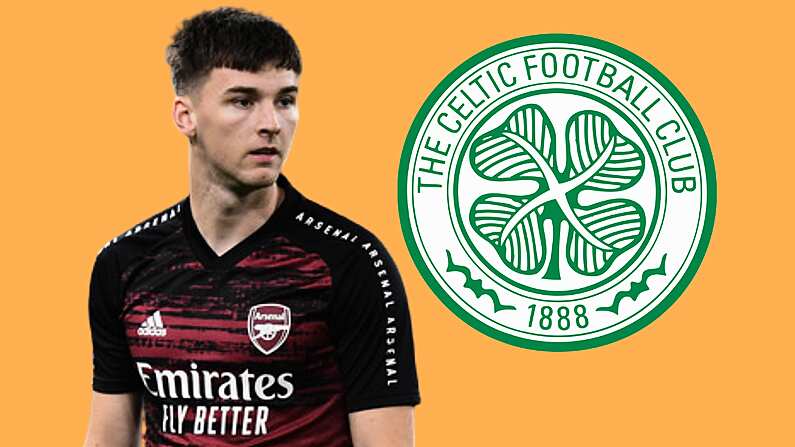As we enter 2017, the modern sports fan is absolutely spoiled for options when it comes to taking in an event. To celebrate their range of home entertainment accessories, Microsoft and Balls.ie are looking back at how our consumption of sport has changed over the last 50 years, and what's more we've got a Microsoft All-in-One Media Keyboard, a Universal Foldable Keyboard and an Arc Touch Bluetooth Mouse to give away. Simply share this article and comment on our Facebook post to enter.
Soon, a new generation of adults will never remember a time when they couldn't watch a match, or a race, or a fight because it was not being broadcast. That idea may seem strange to those of us who had to sit in front of a radio and listen to Ireland's Euro 2000 playoff second leg, a 0-0 draw in Bursa, Turkey where Tony Cascarino started a scrap with the local police, but it's the reality.
And for those out there who grew up listening to All Ireland finals on the radio with their old man, many of whom continue to listen out of preference to the TV (shout out to Marty Morrissey), the suggestion is even more outlandish..
But it's happening. With so many options, so many avenues to immerse yourself in the sport you love, we couldn't help but wonder what might come next, and what is already starting to shape the future of being a sports fan. The best way to do that is with a look at what we've seen so far.
Radio
Back in September, we were given a reminder as to how enjoyable an experience it can be to take in a live sporting event over the wireless. Marty Morrissey gave a heart-warming and genuine welcome to listeners from all over the world, and it drove home the point that despite the things that will follow on this list, there will always be a place for a radio broadcast.
It was once, of course, the only option, and people were happy. Legendary commentators like Mícheál Ó Muircheartaigh were able to vividly describe events for their audiences to feel like they were there.
Nowadays, sporting radio consists of regular live programming as well as coverage of matches. Shows like 'Off The Ball' on Newstalk, and BBC's Radio 5 Live are among the most popular shows on air, if not because people are tuning in at home in their spare time, but because everybody needs to listen to something while driving or commuting. Another great example is legendary Baseball commentator Vin Skully, who retired from his position with the LA Dodgers at the ripe old age of 89, following a staggering 67 years in the job.
The standards have raised, but even in the beginning the radio it possible to be a sports fan. Live coverage of major events, as early as England vs Wales at Twickenham in January 1927, made it so that being unable to attend the event did not mean you had to wait and read about it later.
And it's still relevant.
Television
Watching live Premier League football in Ultra 4K High Definition is creepy, for lack of a better word. The picture is so clean, so crisp that it looks as if you're watching through a window into the stadium. I can now make out the names of Michael Carrick's children on his boots when I'm watching Manchester United.
As great as it is to listen to the discussion around your sport, it certainly helps if you can see it. TV revolutionised football. From George Best becoming as big as The Beatles, to the introduction of Sky Sports and the branding of the Premier League, there's no way Paul Pogba earns £15m a year if you can't see him wearing a bright shiny jersey ladened with sponsors every weekend.
Think of your favourite ever goal. Think of the first time you saw it, even better if you were lucky enough to watch it take place in real time. It goes without saying that TV is the most important technological advancement in sport. However even they're changing these days, with TV remotes becoming a thing of the past as people switch to wireless keyboards - like the Microsoft All-in-One Media Keyboard - to surf the web on their television.
For the GAA, the Sunday Game went from being a special event only for the biggest matches, to mandatory viewing every single weekend during the season. Rugby, too, was even able to turn professional thanks to the revenue that could be generated from broadcasting the games.
But is it dying? Are monitors and laptops becoming the new medium for 24/7 sporting coverage? If given the choice between watching on a television or streaming from a computer no sports fan would opt for the later, given the possibility of a stream dropping or a network cutting out. So for the time being, until those concerns are totally eliminated, television broadcasts matter a great deal.
But the content is slowing moving online. BT Sport broadcast live to Facebook before big matches, here's Chris Sutton and Robbie Savage arguing about Celtic being a big club. But more on this later.
Teletext
Oddly, the UK and Ireland cultural staple that is checking the scores on the 'auld teletext did not reach North America. Developed in the UK, it didn't translate well to NTSC broadcast systems, so remained mainly in Europe.
And it was brilliant.
Every football fan over the age of 20 has memories of reading transfer rumours, finding the latest scores, and checking the league tables on Teletext, which became a standard in most household televisions by the late 90s. BBC service was outstanding, and there is a cult following for Channel 4's 'Bamboolze' interactive quiz, but in Ireland we loved the Aertel pages, and pressing 220 would bring up a plethora of reliable up-to-the-minute football content.
It may be one of the less significant advancements in the daily life of a sports fan, but it had a big impact.
Video Gaming
There is no doubt about it, the influence of video games has directly shaped how we talk about and look at football, as well as almost every other sport. It is well publicised that 'Football Manager' has such a significant scouting system that real professional clubs used the game as a consultant, but someone who so much as plays a few games of FIFA 17 on Xbox One at the weekend is constantly learning about the game.
You become familiar with teams and players that you may not get the chance to watch, and an aspect that is often overlooked when discussing the role of video games in sport is how much you can learn about a totally new sport by playing it's virtual represensation.
I, like many people I know, learned the rules of American Football as a teenager by playing through trial and error on the Madden series. I got to know who the teams were, who the star players were, and even learned teams' playbooks, which I would recognise while watching the real thing.
Ever since around 2003 when character models stopped looking like pointy robots and more like the actual players, it's provided millions with a way to connect with the sport they love or simply want to know more about.
And speaking of Football Manager, even it is evolving. Ten years ago we were playing it on PCs, now it's becoming hugely popular on tablets, with accessories like the Microsoft Universal Foldable Keyboard and the Arc Touch Bluetooth Mouse or Wireless Mobile Mouse 1850 further enhancing the experience.
The Internet
Yeah, this is a big one. The internet opened the possibility to consume football on demand, at any time we wanted. If there was nothing on the TV or radio, we could go online and read, watch, comment, and share all sorts of football clips, rumours, and information. And it keeps growing.
The remote control we once used to use for the teletext will soon be outdated, due to our need to type and navigate. Many are already adopting universal all-in-one media keyboards, because anyone who has used Netflix will know that a TV remote and text input don't work well.
Online forums and chat boards were the start of sports on the world wide web. The highlights and clips would soon take off, and everybody can think of the earlest sporting moments they watched on the likes of YouTube or someone's Bebo homepage.
The only thing you couldn't quite do, especially in rural Ireland, was rely on it for your sport. There was no way you could risk missing the match, so the TV was still the go-to option..
Until those risks became more and more marginal.
Social Media & Streaming
We now live in a world that is constantly connected. You're probably reading this on your phone, or laptop, and there's a good chance your commuting or on the go while going so. That means that content has becoming increasingly quick, and to the point.
A scroll through your Facebook feed will bring you food being prepared and pulled apart in slow motion, videos of dogs, and occasionally a breathtaking goal after a goalkeeper went up for a corner and scored a bicycle kick in South Africa, or Odell Beckham Jnr pulled in an incredible one-handed catch. How many people in Ireland do you think watched the Cubs win the World Series on TV? And yet how many people have you heard talking about it?
The intensity of mass sharing on social media has made it simple to bring sporting content to your brain within seconds of switching on your phone, tablet, or computer. That's what we do now, we see something, we say 'Wow', and we want other people to see it too.
It can bring an entire nation together, as shown by Gary and Paul O'Donovan, who within 20 minutes after giving their first post-race interview at the Olympics were national stars, and their must-see clips became the talk of the country. Then there's Conor McGregor, who has gone from the dole to being one of the single most famous athletes on the planet. His insanely popular attitude is made for those viral moments, and the world can't get enough.
As for streaming, it has become so popular thanks to advances in broadband internet technology and the widespread availability of laptops and tablets, that the media is full of reports that TV viewership is plummetting, despite the rising costs of broadcasting the world's biggest sporting leagues and events. Just look at what the NFL are doing with Twitter this year.
You would have to think that online subscription services, such as the ones already in place albeit limited like UFC Fight Pass, will become standard, and we dream of one day being able to avail of a Netflix-like service for live sport.
Virtual Reality & The Future
So what's next?
Well, I've seen enough videos of people falling over after being convinced that the virtual rollercoaster they are experiencing is real, to know that VR is getting pretty serious.
As headsets and devices become more common, and drop in price, there is going to be some pretty exciting opportunities for sports fans. There already are, as you can watch live matches through a virtual reality headset to simulate a theater, complete with other football fans enjoying the game alongside you.
It is not ridiculous to envisage a situation were you can go on stadium tours from the biggest arenas in the world while sat in your living room, and who knows where it will go from there.
We are so obsessed with sport, that we've never stopped searching for ways to experience it further. It's cool to look back on the way we used to enjoy an event or catch up on the news, and it's fun to think about what might lie ahead. I vivdly remember playing FIFA 2003 on the original Xbox and being blown away that I could tell the difference between Gary and Phil Neville.
Just think about where we'll be for FIFA 33...











